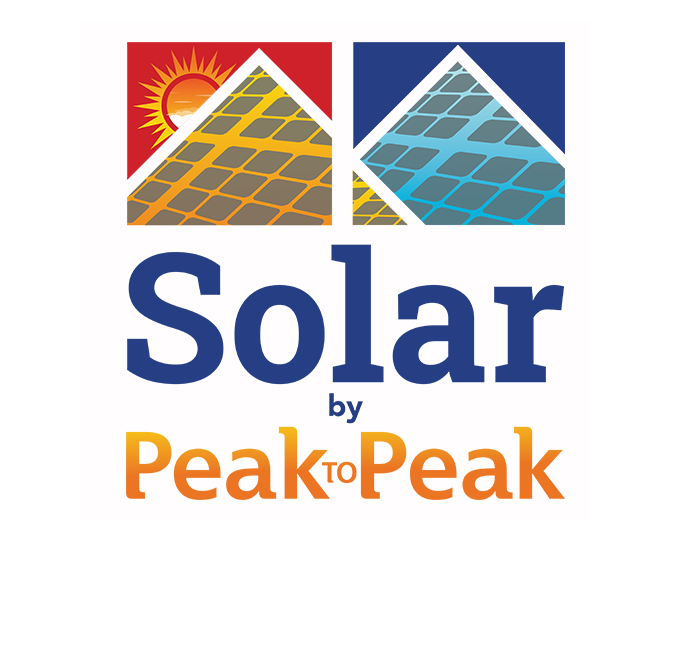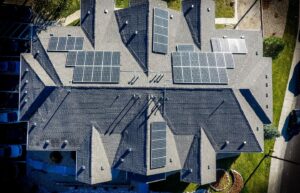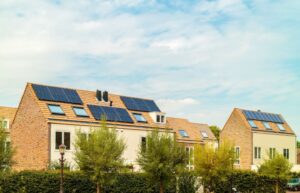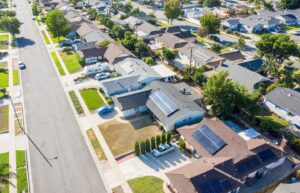Solar panels have become an increasingly popular choice for homeowners seeking a sustainable and cost-effective energy solution. In recent years, the cost of solar panels has significantly decreased, making them more accessible to a wider range of consumers.
By installing solar panels, homeowners can not only reduce their carbon footprint but also enjoy long-term energy savings.
Unlike traditional power sources that rely on fossil fuels and are subject to fluctuating prices, solar power provides a stable and renewable source of energy. This means that homeowners can benefit from consistent electricity rates and potentially even sell excess energy back to the grid through interconnection agreements.
Many companies now offer financing options and incentives to help offset the upfront solar panels cost of solar panel installation.
At Solar by Peak to Peak, we don’t just install solar panels; we empower homes and businesses to embrace a greener, more cost-effective future. Join us on the journey towards clean energy and discover the countless benefits of solar power with our dedicated team of experts.
Understanding Solar Panel Costs
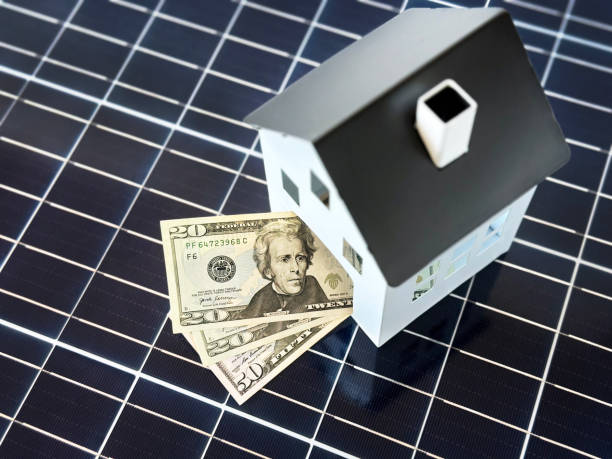
Solar panels have become an increasingly popular choice for homeowners looking to harness renewable energy and reduce their carbon footprint. However, one of the main concerns that often arises is the cost of installing solar panels.
Average Cost by State
The cost of solar panels cost can vary significantly depending on the state you reside in. Factors such as local regulations and incentives play a crucial role in determining the average cost.
For example, states like California and New York tend to have higher installation costs due to stricter regulations and higher demand. On the other hand, states with more lenient regulations and abundant sunlight, such as Arizona or Texas, may have lower average costs.
Factors Influencing Costs: Types, Complexity, and Market Dynamics
There are several options available on the market. The most common types include monocrystalline and polycrystalline panels.
Monocrystalline Panels
Monocrystalline panels are known for their high efficiency but come at a slightly higher cost compared to polycrystalline panels.
Polycrystalline Panels
Polycrystalline panels offer a more affordable option while still providing decent efficiency levels.
Thin-Film Solar Panels
Another type worth considering is thin-film solar panels. These panels are generally less expensive than crystalline silicon-based ones but may have lower efficiency levels.
Thin-film technology is ideal for large-scale installations where cost-effectiveness outweighs maximum efficiency.
Installation Complexity
The complexity of installing solar panels can also impact overall costs. Factors such as roof type and shading issues can affect solar panel cost, installation difficulty, and subsequently increase expenses when getting a solar system. Some installations might require additional equipment or modifications to accommodate specific conditions, further adding to the total cost.
To ensure a smooth and efficient installation process without any costly mistakes or delays, it’s crucial to hire an experienced installer like Solar by Peak to Peak. Their expertise can help you navigate any complexities and ensure that your solar panels are installed correctly.
Market Dynamics
The increasing demand for solar panels, driven by growing environmental concerns, has led to more competitive market dynamics.
As more people adopt solar energy, the industry becomes more saturated, which can potentially lower prices. Changes in government policies and incentives can also influence market dynamics and affect costs.
For instance, in Denver, Colorado, where solar energy is gaining popularity among homeowners, the market has become more competitive. This increased competition can lead to better pricing options for consumers looking to install solar panels.
Investment Worth of Solar Panels
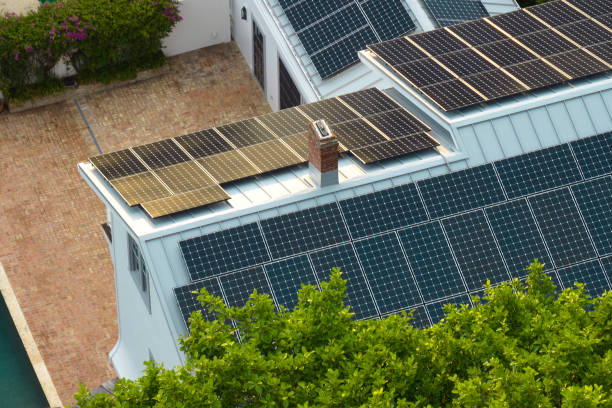
Financial Benefits and Savings
Solar panels are not only an environmentally friendly choice but also a smart financial investment. By installing solar panels, homeowners can enjoy various financial benefits and long-term savings.
One significant advantage is the federal solar tax credit. This incentive allows homeowners to deduct a percentage of their installation costs from their federal taxes. The exact calculation is based on the total cost of the solar panel system.
However, it’s essential to consult with a tax professional to understand the specific calculations and eligibility criteria.
In addition to the tax credit, solar panels offer long-term energy savings. By generating electricity for your home, these panels reduce your reliance on traditional energy sources. Over time, the energy savings can offset the initial installation costs.
Of course, the actual amount of savings depends on factors such as your energy consumption and local utility rates.
Break-Even Analysis
To determine whether investing in solar panels is worth it for you, conducting a break-even analysis is crucial. This analysis considers upfront costs, potential energy savings, and available incentives to calculate how long it takes to recoup your investment.
By understanding your break-even point, you can make an informed decision about installing solar panels. Factors such as roof space availability and system size (measured in kilowatts) will also influence this analysis.
Home Value Increase
Another aspect that adds value to investing in solar panels is the potential increase in your home’s value. Studies have shown that homes equipped with solar panel systems tend to sell at a premium compared to those without them.
Several studies have shown that homes with solar panels tend to sell for higher prices than similar homes without solar installations. The logic behind this is that potential homebuyers see solar panels as a desirable feature that can lead to reduced energy costs.
Additionally, as awareness of environmental issues and interest in sustainable living practices increase, the perceived value of solar panels may also rise.
It’s important to note that the actual impact on home value can vary, and the return on investment may not be immediate. The overall economic and environmental benefits of solar panels, along with potential energy savings, are factors that can contribute to the increased value of a home with a solar installation.
If you’re considering installing solar panels, it’s a good idea to research the specific dynamics of your local real estate market and consult with real estate professionals for advice tailored to your situation.
Paying for Solar Panels
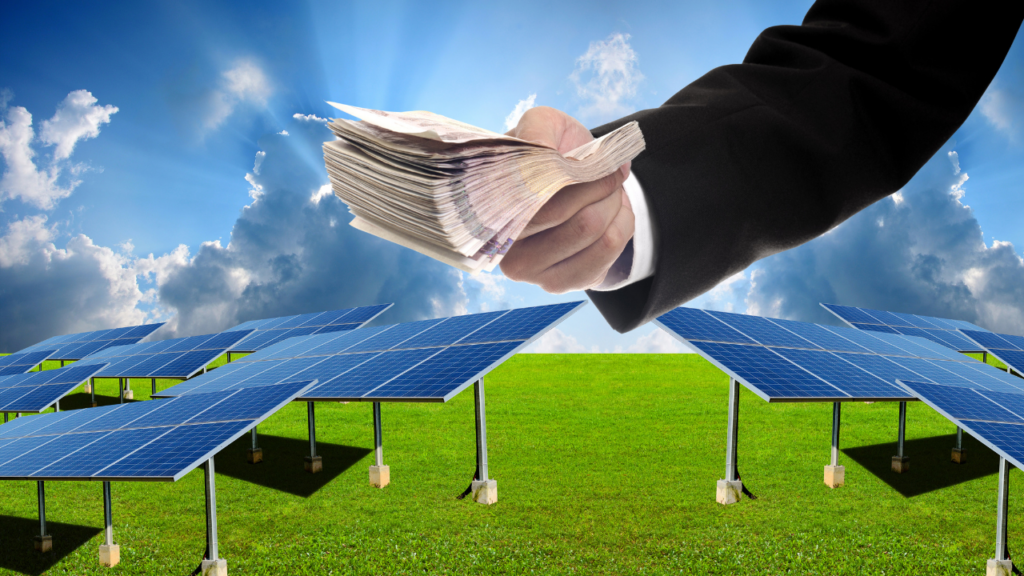
Payment and Financing Options
Homeowners have various options available to them. These include cash purchases, loans, or leases. Each option has its own advantages and considerations that should be taken into account.
Cash Purchase
Opting for a cash purchase means paying the full cost of the solar panel installation upfront. While this may require a significant initial investment, it eliminates the need for monthly payments and allows homeowners to enjoy the benefits of reduced electricity bills immediately.
However, not everyone has the financial means to make such a large payment all at once.
For those who prefer not to make a cash purchase, there are loan and financing options available. Solar loans offer an opportunity to spread out the cost of installation over time with fixed monthly payments. This can make solar panels more affordable and manageable for homeowners on a budget.
Solar Lease
Another financing option is leasing solar panels. With a solar lease, homeowners can essentially “rent” the panels from a provider in exchange for a fixed monthly fee. While the solar lease option may not provide the same long-term financial benefits as purchasing or financing, it can still help reduce electricity bills and provide access to clean energy without requiring an upfront payment.
Before making any decisions about payment or financing options, it is important for homeowners to thoroughly explore each method’s long-term financial implications. This includes considering factors such as interest rates on loans or lease terms and understanding how these choices will impact their overall savings on electricity bills.
State and Federal Incentives
In addition to exploring different payment methods, homeowners should also consider state and federal incentives that can further offset the costs of installing solar panels.
Investment Tax Credit
Federal programs like the Investment Tax Credit (ITC) provide substantial support for solar panel installations. The ITC allows homeowners to deduct a percentage of their system’s cost from their federal income taxes. By taking advantage of this incentive, homeowners can significantly reduce their overall costs and increase their return on investment.
Residential Renewable Energy Tax Credit
In addition to the Investment Tax Credit (ITC), another noteworthy federal tax credit is the Residential Renewable Energy Tax Credit. This credit applies to a variety of renewable energy systems, including solar panels, and allows homeowners to claim a percentage of their qualified expenditures as a credit on their federal income tax.
The Residential Renewable Energy Tax Credit has played a crucial role in promoting the adoption of solar technology by making it more financially accessible for homeowners. This tax credit, coupled with other incentives, not only contributes to the growth of the renewable energy sector but also aligns with broader government initiatives aimed at fostering sustainability and reducing the carbon footprint.
As a result, homeowners not only contribute to environmental conservation but also enjoy financial benefits through these federal programs.
Other Solar Panel Incentives by State
It’s not just the federal government that offers incentives; many states also provide their own programs to encourage solar panel adoption. These can include rebates, tax credits, or performance-based incentives. Homeowners should research the specific incentives available in their state and take advantage of any that apply to them.
By understanding and utilizing both state and federal incentives, homeowners can significantly reduce the upfront costs of installing solar panels. This makes renewable energy more accessible and financially viable for a wider range of homeowners.
Installation and Maintenance Insights
Best Time for Installation
The ideal time to install solar panels depends on various factors, including weather conditions and local regulations.
If you’re considering installing solar panels in Denver, it’s advisable to consult with professionals who can provide insights into the optimal installation timing. They will take into account factors such as sunlight exposure and seasonal variations to help you make an informed decision.
Planning your solar panel installation during periods with higher sunlight exposure can maximize energy production. It makes sense, right? The more sunlight your panels receive, the more electricity they can generate.
So, keep an eye on the weather forecast and choose a time when there is plenty of sunshine to ensure that your panels operate at their highest efficiency.
Cost-Efficiency Measures and Tips
Saving money on the initial costs of installing solar panels is a top priority for many homeowners. Fortunately, there are several measures and tips to consider that can help make solar panels more affordable and cost-effective.
Saving Money on Initial Costs
Exploring different financing options is an excellent way to reduce upfront expenses when investing in solar panels. Many financial institutions offer loans specifically designed for renewable energy projects. By choosing the right financing option, homeowners can spread out the cost of installation over time, making it more manageable.
Taking advantage of available incentives is another effective strategy for lowering the initial investment requirements.
Incentives such as tax credits or rebates can significantly offset the cost of installing solar panels. It’s crucial to research and understand the incentives available in your area to maximize savings. Some states or municipalities may offer additional grants or programs that further reduce costs.
Careful planning and obtaining multiple quotes are essential steps in finding competitive pricing for solar panel installations.
By consulting with multiple reputable installers, homeowners can compare estimates and negotiate better deals. This process allows them to find the most cost-effective option without compromising quality.
Hidden Costs Awareness
While considering the cost-efficiency of solar panels, it’s important to be aware of potential hidden costs that may arise during or after installation.
Solar Panel Efficiency Rate
One significant factor to consider is the efficiency rate of the panels themselves. Higher efficiency rates generally come at a higher price point but can result in greater long-term savings due to increased energy production.
Location
Location plays a role in determining overall costs and savings from solar panel installations.
For instance, if you reside in Denver, Colorado, where sunlight hours are abundant throughout the year, you may experience greater energy generation compared to areas with less sunlight exposure. Therefore, understanding your specific location’s climate conditions is crucial when estimating the potential savings from solar panels.
Maintenance Costs
Maintenance costs should also be taken into account when considering overall affordability. While solar panels require minimal maintenance, occasional cleaning and inspections are necessary to ensure optimal performance. It’s important to factor in these costs when budgeting for solar panel installations.
Operational Aspects of Solar Panels
Solar Panels at Night and Autonomy
Solar panels are undoubtedly an excellent source of clean, renewable energy during the day when the sun is shining. However, a common concern among homeowners is whether solar panels can generate electricity at night or during cloudy periods.
The truth is that solar panels do not produce electricity in the absence of sunlight. There are solutions to ensure a continuous power supply even when the sun goes down.
Incorporating Battery Storage Systems
One way to address this issue is by incorporating battery storage systems into your solar energy system. These batteries allow you to store excess energy generated by your solar panels during sunny periods for use later on, such as at night or on overcast days.
By harnessing and storing this surplus energy, you can maintain a level of autonomy and reduce reliance on the grid.
Can Your House Run Solely on Solar Power?
To determine if your house can run solely on solar power, several factors need consideration.
Energy Consumption
The first factor is your energy consumption. If your home has high energy demands due to numerous appliances or a large household, it may be more challenging to meet all your needs with solar alone.
Panel Capacity
Panel capacity plays a crucial role; larger panel capacities mean more electricity generation potential.
Consulting with professionals who specialize in solar equipment and installation can help assess whether running solely on solar power is feasible for your specific circumstances.
They will evaluate factors like your location (e.g., Denver, Colorado), available sunlight hours, roof orientation, and shading issues to provide an accurate assessment.
Efficiency Maximization Strategies
While maximizing efficiency might not directly address generating electricity at night, it plays a vital role in optimizing overall performance and reducing reliance on non-solar sources during daylight hours. Here are some strategies to consider:
Implementing Efficiency Measures
Using energy-efficient appliances and LED lighting throughout your home reduces overall energy consumption. These improvements not only save money but also make better use of the electricity your solar panels produce.
Regular Maintenance
Just like any other equipment, solar panels require regular maintenance to ensure optimal performance. Cleaning the panels regularly and inspecting for any damage or obstructions helps maximize their efficiency and longevity.
Monitoring Electricity Usage
Keeping track of your electricity usage allows you to identify areas where further efficiency improvements can be made. By understanding which appliances or activities consume the most energy, you can make informed decisions about conservation measures.
By implementing these strategies, you can make the most of your solar energy system’s capabilities and minimize dependency on non-renewable sources of power.
Discover the Future of Energy with Solar by Peak to Peak
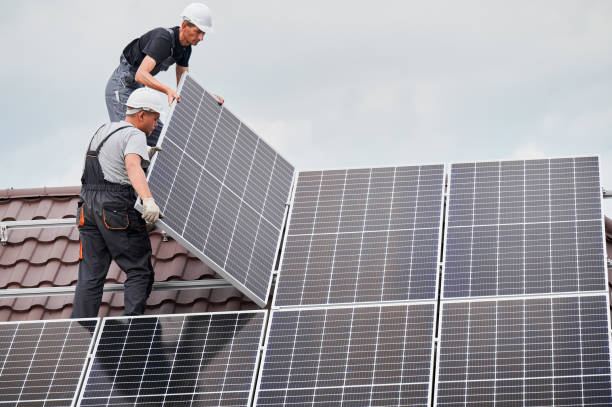
Expertise and Experience
At Solar by Peak to Peak, we pride ourselves on our expertise and experience in the solar industry. With years of knowledge under our belts, we have become leaders in providing sustainable energy solutions to homeowners and businesses alike.
Our team of professionals is well-versed in all aspects of solar panel installation and maintenance, ensuring that you receive top-notch service from start to finish.
It’s crucial to work with a company that knows what it’s doing. We understand the intricacies of solar technology and stay up-to-date with the latest advancements in the field.
Our experts will guide you through every step of the process, from assessing your energy needs to designing a customized solar solution for your property.
Customized Solar Solutions
We believe that every customer is unique, which is why we offer customized solar solutions tailored specifically to your needs.
Whether you’re looking to power your home or business, our team will work closely with you to design a system that maximizes energy production while fitting seamlessly into your existing infrastructure.
Our experts will conduct a thorough assessment of your property, taking into account factors such as location, roof orientation, and shading analysis. This detailed analysis allows us to determine the optimal placement and configuration of your solar panels for maximum efficiency.
By customizing each installation, we ensure that you get the most out of your investment and achieve significant savings on your energy bills.
Commitment to Industry Standards and Certifications
When choosing a solar provider, it’s essential to select one that adheres to industry standards and certifications.
At Solar by Peak to Peak, we are committed to delivering high-quality installations that meet or exceed these rigorous standards. Our team consists of certified professionals who follow best practices for safety and quality assurance.
We are proud members of reputable organizations such as the Solar Energy Industries Association (SEIA) and follow their guidelines to ensure the highest level of service. By partnering with us, you can have peace of mind knowing that your solar panel system will be installed correctly and in compliance with all relevant regulations.
Final Thoughts on Solar Panels Cost in 2023
Understanding the specific costs associated with solar panel installation, the incentives available, and local considerations is crucial when deciding to go solar.
By carefully evaluating these factors, homeowners can determine if installing solar panels aligns with their financial goals and environmental values.
Embark on the journey towards a sustainable and cost-effective future with Solar by Peak to Peak as your guiding light. Ready to harness the boundless power of the sun, we invite you to take the first step towards a greener tomorrow by exploring our affordable and highly efficient solar panel options.
Contact us today to receive personalized assistance and delve into the world of renewable energy.
